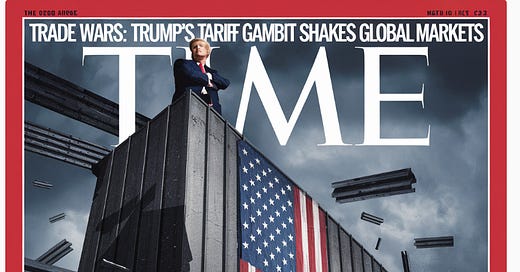Trump signs 25% tariffs on steel and aluminum that will apply to ALL countries.
Trump also says chips and cars could be next.
In a significant move that has sent shockwaves through global markets, President Donald Trump has signed an executive order imposing a 25% tariff on all steel and aluminum imports into the United States, regardless of their country of origin. This sweeping measure, which Trump had hinted at over the weekend, marks a dramatic escalation in his administration's protectionist trade policies.
The tariffs, set to take effect immediately, are expected to have far-reaching consequences for both domestic and international industries. While the move is aimed at bolstering U.S. steel and aluminum producers, it has already drawn sharp criticism from American allies and trading partners, who fear it could spark a global trade war.
Trump justified the tariffs as necessary to protect national security and boost domestic manufacturing, stating, "Any steel coming into the United States will have a 25% tariff, and the same goes for aluminum" Everyone knows economists that the tariffs will lead to higher prices for consumers on a wide range of products, from cars to canned goods.
In a further development that has heightened concerns among business leaders and foreign governments, Trump indicated that semiconductors and automobiles could be the next targets for similar tariff actions. This suggestion has sent ripples through the tech and automotive industries, which rely heavily on global supply chains.
The president also announced plans to unveil "reciprocal tariffs" later this week, which would match the duties imposed by other countries on U.S. goods.
This move is seen as part of Trump's broader strategy to reshape global trade relationships and address what he perceives as unfair practices by America's trading partners. As markets react to the news, many countries are already preparing retaliatory measures. Canada, the largest exporter of steel to the U.S., has vowed to respond with its own tariffs on American goods. Similarly, the European Union and China have indicated they are considering countermeasures.
The implementation of these tariffs marks a pivotal moment in U.S. trade policy, with potential ramifications for global economic stability and international relations. As the situation unfolds, businesses, consumers, and governments worldwide are bracing for the impact of what could be the beginning of a broader trade conflict
What about Cars and Semiconductors?
President Trump has also indicated that cars and semiconductors could be the next targets for tariffs.
On January 27, 2025, during a retreat for House Republicans, Trump stated that he would like to implement tariffs on computer chips and semiconductors "in the very near future". While he didn't specify an exact timeline or rate for these tariffs, he suggested they could be as high as 25%, 50%, or even 100%.
Regarding the automotive industry, Trump has also hinted at potential tariffs. He mentioned that an announcement regarding tariffs on steel, aluminum, and copper was imminent, which would indirectly affect the automotive sector. Moreover, Trump has consistently presented himself as a proponent of U.S. automotive excellence and has maintained automotive tariffs in the past. The potential impact of these tariffs on the semiconductor and automotive industries could be significant:
For semiconductors, tariffs of up to 100% on Taiwanese chips have been proposed. This could lead to higher costs for U.S. tech firms and potentially damage relations with a key U.S. ally.
In the automotive sector, tariffs could affect many popular models sourced from Canada and Mexico, such as the Chevy Equinox, Toyota Tacoma, Honda Civic sedan, and Honda CR-V.
These proposed tariffs are part of Trump's broader trade strategy, which includes a potential 10% to 20% universal tariff and levies of up to 60% for China. The implementation of these tariffs could have far-reaching consequences for global supply chains, manufacturing strategies, and consumer costs across multiple industries.




